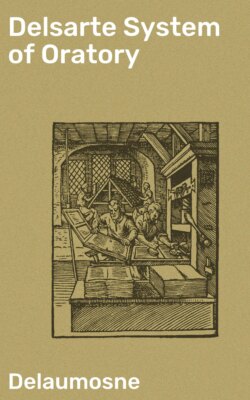Читать книгу Delsarte System of Oratory - Delaumosne - Страница 46
На сайте Литреса книга снята с продажи.
Chapter VI.
Of the Torso.
ОглавлениеTable of Contents
The torso includes the chest, and shares the shoulder movements with the arms.
The Chest.--There are three chest attitudes, eccentric, concentric and normal.
1. If the chest is greatly dilated, this is the eccentric state--the military attitude, the sign of energy.
2. The normal, when the chest is in a state more homogeneous, less contentious, more sympathetic, as in the statue of Antinous.
3. The concentric, when the chest is hollow, with the shoulders elevated and inclining forward.
The convex eccentric chest is the sign of the agent, or of him who gives.
The convex concentric chest or the pathetic, is the sign of the sufferer, or of him who receives.
The chest drawn in with the shoulders elevated, is the expression of the sublime.
From these three positions, the eccentric, the concentric and the normal, are derived nine degrees or species. Thus in each of these genera, the torso is inclined toward the speaker, or away from him, hence we have three times three, or nine, or the triple accord.
Criterion of the Face.
The chest need not be lowered; it is here that all the energy concentrates.
The Shoulders.--Every sensitive, agreeable or painful form is expressed by an elevation of the shoulders. The shoulders are the thermometer of the sensitive and passional life. If a man's shoulders are raised very decidedly, we may know that he is decidedly impressed.
The head tells us whether this impression is joyous or sorrowful. Then the species belongs to the head, and the genus to the shoulder.
If the shoulder indicates thirty degrees, the head must say whether it is warmth or coldness. The face will specify the nature of the sorrow or joy whose value the shoulders have determined.
The shoulder is one of the great powers of the orator.
By a simple movement of the shoulder, he can make infinitely more impression than with all the outward gestures which are almost always theatrical, and not of a convincing sort.
The shoulder, we have said, is the thermometer of emotion and of love. The movement is neutral and suited to joy as well as to sorrow; the eyes and mouth are present to specify it.
The shoulder, like all the agents, has three and hence nine distinct phases.
The torso is divided into three parts: the thoracic, the epigastric and abdominal.
We shall state farther on, the rôle of these three important centres.
Liars do not elevate their shoulders to the required degree, hence the truth or falsity of a sentiment may be known.
Raphael has forgotten this principle in his "Moses Smiting the Rock." None of his figures, although joyous, elevate the shoulder.
